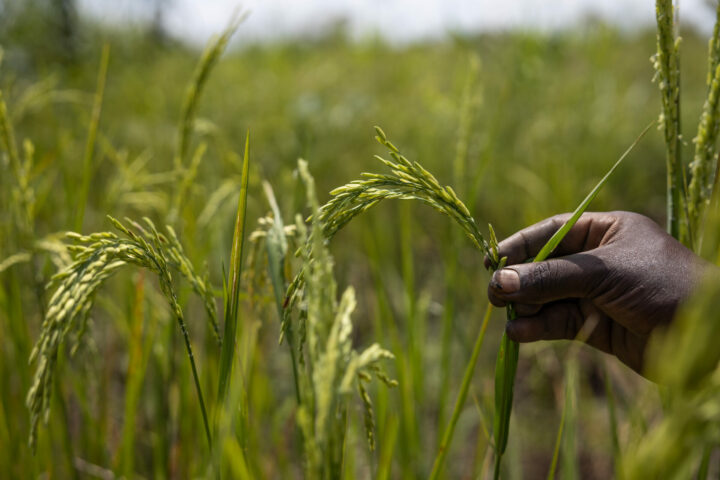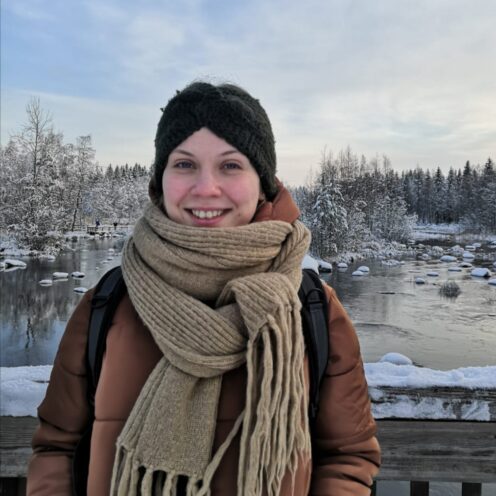Business and human rights: Perspectives on the security of human rights defenders

The picture is from Uganda, where serious human rights violations have been suspected in a project of the African Development Bank and the Nordic Development Fund. Photo: Sofi Lundin
The Executive Director of Business and Human Rights Resource Center (BHRRC) Phil Bloomer visited Finland at the end of March. KIOS had the pleasure of hosting Mr. Bloomer at our offices for a discussion regarding concerns relating to human rights in business. The discussions touched upon the BHRRC’s work on green energy transition, Indigenous peoples’ rights in green transition, EU Corporate Due Diligence Directive, and the security of human rights defenders (HRDs)*.
KIOS and Bloomer discussed the security of HRDs working with irresponsible business activities. BHRRC constantly tracks attacks against human rights defenders working on human rights violations of companies. According to BHRRC, the majority of these attacks are against HRDs working to expose how irresponsible business conduct harms our shared environment.

Pictured KIOS staff with Phil Bloomer (on the right)
KIOS partners working on business and human rights have experienced this firsthand. Attacks against defenders include intimidation, harassment, smear campaigns, death threats, judicial harassment such as criminal charges and arbitrary arrests, and even physical violence and killings. Since there are often big economic and political incentives involved, speaking against harmful business practices or the lack of action from governments in holding companies accountable to human rights can be dangerous. Big companies have also much more power than local human rights defenders do.
Uganda, a focus country of KIOS, was the tenth most dangerous country for HRDs raising concerns about irresponsible business conduct in 2022, with 17 attacks against them recorded. Latin America and Asia & the Pacific remained the most dangerous regions for HRDs raising concerns about irresponsible business conduct. KIOS helps our grantee organizations to mitigate these risks, for example by funding specific activities aimed at enhancing safety and security of HRDs and their organizations.
Most of the business-related human rights violations globally happen in mining sector. This is concerning also because the demand for transition minerals will increase drastically in the near future, as those are needed for green transition. Phil Bloomer also pointed out that half of the world’s transition mineral reserves are on or near Indigenous lands, meaning that there will be increasing pressure on Indigenous communities and people defending Indigenous land rights. Other sectors where violations are common are agribusiness, oil and gas, metal and steel, and tourism.
Securing human rights is the duty of businesses and governments
KIOS calls for companies and states to protect human rights and human rights defenders by following the United Nations Human Rights Guiding Principles.
The UNGPs define the responsibilities of companies and governments in ensuring that business conduct does not harm human rights, i.e. who is responsible for making sure no human rights violations occur due to business practices, or what to do if they do occur.
The UNGPs include three pillars:
- State duty to protect human rights
- Corporate responsibility to respect human rights
- Access to remedy for victims of business-related abuses
This means that governments have a responsibility to ensure that states do not violate anyone’s human rights by passing laws that prevent human rights violations and implementing these laws, and that companies have a responsibility to not violate human rights instead of only following local laws. The third pillar of UNGPs means that if a company makes a human rights violation, governments must make sure that the victims can file a complaint to a court or to some other mechanism, and that the complaint is investigated and settled. Companies should also have their own grievance mechanisms that are available to victims. The EU Corporate Sustainability Due Diligence Directive which was approved in March 2024 by the EU Council is based on UNGPs and will make it mandatory for big companies based or trading in Europe to employ due diligence throughout their supply chains. This is a big step in the right direction, although there were some last-minute changes to some parts of the directive that make it less effective.
One of the amendments was that companies have to be over twice the size of what was originally agreed in order to be obliged to comply with the law, meaning that less companies are in the scope of the directive. Another amendment was that product disposal, dismantling, recycling, composting, and landfilling, i.e. downstream activities, are not included in the due diligence duties of companies. Another disappointment in the watered-down version of the directive was that the reversal burden of proof was taken out of the directive. This would have helped victims of human rights abuse to get justice by allowing a CSO to raise a lawsuit against the violating company in the name of the victims. This amendment to the directive was insisted by Finland.
The EU CSDDD is a positive step towards enhancing the responsibility of companies and protection of human rights defenders. KIOS calls for further improvement of the directive, including making smaller companies obliged by it, adding downstream activities of companies to the directive, and adding the reversal burden of proof to the directive.
Business and Human Rights Resource Center is a global organization that advances human rights in business by driving accountability and transparency, strengthening partnerships and alliances, and by influencing decision-makers. More information about BHRRC’s work can be found here.
* Human rights defenders are people who promote and protect human rights of themselves or others. Human rights defenders work on various issues, and some HRDs dedicate their work on protecting their communities and our planet from abuses by irresponsible business practice. KIOS supports human rights defenders by funding local civil society organizations that work on various human rights issues. According to our strategy, one category of CSOs supported by KIOS are organizations working on business and human rights.

